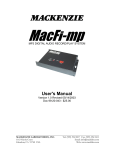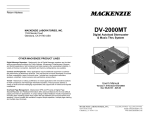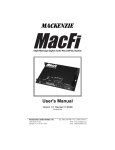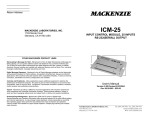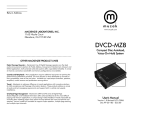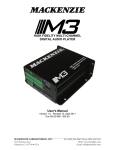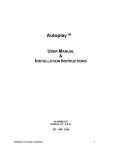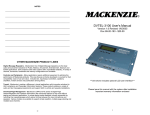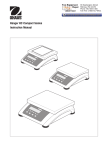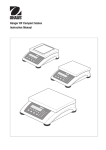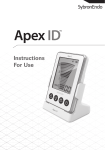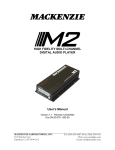Download User`s Manual - Mackenzie Laboratories, Inc
Transcript
__________________ __________________ __________________ Return Address MACKENZIE LABORATORIES, INC. 1163 Nicole Court Glendora, CA 91740 USA MP3 DIGITAL AUDIO RECORD/PLAY SYSTEM --------------------------------------------------------------------------------------------------------------- OTHER MACKENZIE PRODUCT LINES Message On Hold & Storecasting - Mackenzie's full line of digital Message-OnHold systems, turn your telephone into a powerful marketing tool. The DYNAVOX series offers maintenance free digital playback with tape, modem or satellite download. Several varieties are available with advanced features such as MusicThru, individual message enable/disable, message sequencing and more. Digital Message Repeaters - Mackenzie's line of Digital Message repeaters are the ideal audio and video solutions for Information, Amusement, Entertainment, Museum and Exhibit applications. Self contained solid state systems offer unparalleled reliability. A variety of channel, connection, bandwidth and memory configurations are available. Page Stacker / Feedback Eliminator - Mackenzie's OPM series of Digital Page Stacker/Repeater and Feedback Eliminators offer advanced features for the most difficult paging and intercom applications. A unique design makes feedback virtually impossible by recording then repeating pages which opens the loop between the input microphone and speakers. Various models are available to support simple repetition, multiple page stacking and multiple input channels. Transit - Mackenzie is making a difference in transit applications with innovative solutions for ADA compliance and Passenger Information Systems. These products address a variety of audio and text messaging requirements and support both invehicle and wayside installations. User's Manual Version 1.0 Revised 12, June 2015 Doc 99-20-204 - $25.00 MACKENZIE LABORATORIES, INC. 1163 Nicole Court Glendora, CA 91740 USA Tel: (909) 394-9007 Fax: (909) 394-9411 Email: [email protected] Web: www.macklabs.com Warranty & Registration Card for the MacFi-se - MP3 Digital Audio Record/Play System General Safety Instructions Always follow these basic safety precautions when using the system: 1. 2. 3. 4. Read carefully and understand all instructions. Follow all warnings and instructions marked on the product. DO NOT block or cover ventilation slots and openings. DO NOT place the product in a closed enclosure or cabinet unless proper ventilation is provided. 5. Never spill liquid on the product or drop objects into the ventilation slots and openings. Doing so may result in serious damage to the components. 6. Repair or service must be performed by a factory authorized repair facility. 7. DO NOT staple or otherwise attach the power supply cord to building surface. 8. DO NOT use the product near or in wet or damp places, such as wet basements. 9. DO NOT install during lightning storm. 10. Never touch un-insulated wires or terminals unless the unit is disconnected from both power and the rest of the phone system. 11. Use Caution when installing or modifying configuration switches or control lines. 12. The unit must be securely attached to a wall board, rack or table mounted. CAUTION: If any wiring from the system leaves the premises, you must use proper electrical protectors. Date:________________________ Serial No.: _______________________ Purchaser: ___________________________________________________ Address: ___________________________________________________ City: __________________ Phone: __________________ Seller: State: ______ Zip: ____________ Fax: __________ Email: ____________ _______________________________________________________ Address: _______________________________________________________ City: __________________ Phone: __________________ State: ______ Zip: ____________ Fax: __________ Email: ____________ Return warranty card via: FAX: (909) 394-9411 MAIL: Address on reverse side ONLINE: www.macklabs.com/registration.html ------------------------------------------------------------------------------------------------------------------ NOTES __________________________________________________________________ __________________________________________________________________ __________________________________________________________________ __________________________________________________________________ __________________________________________________________________ __________________________________________________________________ __________________________________________________________________ __________________________________________________________________ __________________________________________________________________ __________________________________________________________________ __________________________________________________________________ __________________________________________________________________ __________________________________________________________________ __________________________________________________________________ __________________________________________________________________ Table of Contents 1. OVERVIEW ........................................................................................ 5 1.1 Features and Capabilities ............................................................ 5 General Specifications ................................................................. 6 2. INSTALLATION & CONFIGURATION ............................................... 8 2.1 Installation Steps .......................................................................... 8 2.2 Hardware Configuration ............................................................... 8 2.2.1. Power .................................................................................... 8 2.2.2. Configuration Switches ......................................................... 9 2.2.3. Main Interface Connector.................................................... 12 2.2.4. Expansion Interface Connector .......................................... 13 2.2.5. Audio In Level ..................................................................... 13 2.2.6. Audio In Mic ........................................................................ 13 2.2.7. Audio In Line ....................................................................... 13 2.2.8. Audio Out Level .................................................................. 13 2.2.9. Audio Out Line .................................................................... 13 2.2.10. Audio Out SPKR ................................................................. 16 2.2.11. USB Interface ...................................................................... 16 2.3 Pushbutton & LED Configuration ............................................... 16 2.3.1. Overdrive Indicator .............................................................. 16 2.3.2. Audio Sense Indicator ......................................................... 17 2.3.3. Record Indicator .................................................................. 17 2.3.4. Record Setup Button........................................................... 17 2.3.5. Start/Stop Button ................................................................. 17 2.3.6. Select Button ....................................................................... 18 2.3.7. Message Number and Status Display ................................ 18 2.4 Audio File Format ....................................................................... 19 3. OPERATION .................................................................................... 20 3.1 Recording - Local ....................................................................... 20 3.2 Recording - Remote Control ...................................................... 20 3.3 Playing-Local .............................................................................. 21 3.4 Playing-Remote Control ............................................................. 21 3.5 Memory Clear/Test ..................................................................... 22 3.6 Erase Message .......................................................................... 22 4. MacFi-se Serial Port ........................................................................ 23 4.1 RS-232 (Serial) Command List .................................................. 23 5. WARRANTY, SERVICE & RETURNS ............................................. 24 5.1 Warranty Coverage: ................................................................... 24 5.2 What we ask you to do: .............................................................. 25 5.3 What this warranty does not cover: ............................................ 25 __________________________________________________________________ __________________________________________________________________ 26 3 Shipping Container Contents The following items should be found in the container of MacFi-se, MP3 Digital Audio Record/Play System: ▪ MacFi-se System ▪ Installation and User Guide ▪ Set of four rubber feet Hardware Configurations ▪ MacFi-se; 99 messages, 17 hours + of MP3 playback / recording, RS-232 control, Sync relay, USB Port Optional Accessories: ▪ ▪ ▪ ▪ ▪ ▪ ▪ Power Pack, 12 VDC, 1.0 amp, 115 V 50/60Hz, Order: MacFi-se-PS Rack Mount Kit, Order: MacFi-se RM-KIT RS-232 Cable for Enhanced Unit, Order: RS232-CBL Weather Resistant Speaker with Mount, Order: CS4 Microwave Motion Sensor, Order: MS-2 Input Control Module, 25 start inputs to RS-232, Order: ICM-25-SE USB Memory Key (<x>GB), Order MUSB-<x>GB 4 5.2 What we ask you to do: To get warranty service for your MacFi-se system, you must provide proof of the date of original purchase. In the event you need to ship your MacFi-se system to the factory for service, call us for a return authorization number. When you ship your MacFi-se system, you must prepay all shipping cost. We suggest that you retain your original packing material in the event that you need to ship your MacFi-se system. When sending your MacFi-se system to the factory, include your name, address, phone number, proof of date of purchase, and a description of the operating problem. After repairing or replacing your MacFi-se system, we will ship it to your return address at no cost to you within the USA. Repair or replacement of your MacFi-se system at our factory is your exclusive remedy. 5.3 What this warranty does not cover: This warranty does not cover defects resulting from accidents, damage while in transit to factory, alterations, unauthorized repairs, failure to follow instructions, misuse, fire, flood and acts of God. 25 5. WARRANTY, SERVICE & RETURNS The industrial grade housing and quality construction of the Mackenzie MacFi-se virtually eliminates the need for service or maintenance. There are no user-serviceable components within the Mackenzie MacFi-mp. Refer all servicing to the factory. 5.1 Warranty Coverage: The Mackenzie MacFi-se is tested and checked before shipment and is guaranteed against defective material or workmanship for a period of one (1) year from the date of purchase. Should trouble ever develop, contact the Factory directly by telephone or in writing. If it is determined that the equipment requires Factory service, return it to the Factory. If our inspection shows that the trouble was caused by defective material or workmanship, we will repair or replace the equipment without charge and return prepaid. Repairs made necessary by abuse, improper use, unauthorized service or maintenance, and/or improper installation, as well as out of warranty repairs, will be charged at our regular repair prices in effect at the time. The obligation under this warranty shall be limited to the replacement, repair or refund of any such defective device within the warranty period, at Mackenzie’s discretion. This warranty is in lieu of and excludes all other warranties, expressed or implied, and in no event shall MACKENZIE be responsible for damage to other equipment or property, for any anticipated profits, consequential damages, loss of item, or other operation or use of this product, and MACKENZIE’S maximum liability shall not ever be greater than the price paid for the equipment. This warranty gives you specific legal rights. Your rights may vary from state to state. Inquiries regarding use, repair and service should be made to: MACKENZIE LABORATORIES, INC. 1163 Nicole Court, Glendora, CA 91740 USA Telephone: (909) 394-9007 / FAX No: (909) 394-9411 24 1. OVERVIEW 1.1 Features and Capabilities The Mackenzie MacFi-se family is the most cost effective series of MP3 Digital Audio Record / Play Systems available for industrial usage. Backed by Mackenzie’s years of system design experience, MacFi-se offers a great deal of functionality in a compact and inexpensive package. Messages are user recordable via microphone or line input through a straight forward user interface located directly on the unit. Simple parallel controls for 8 messages are available on terminal connectors. Record and Stop inputs and a Play relay output are also accessible via terminals. The MacFi-se offers up to 99 messages and hours of MP3 audio. MP3 supports up to 15 kHz bandwidth and 80 dB of dynamic range. All 99 messages are accessible from the user interface on the MacFi-se with 8 remote start inputs accessible via the remote activation pluggable terminal. Because the memory is FAT formatted, each of the messages can be of different duration. FAT also provides for replacement messages to be a different length than the original, maximizing memory efficiency and compatibility with future applications. The MacFi-se retrieves stored audio data from non-volatile flash memory, eliminating the need for battery backup, and delivers superb sound quality. The MacFi-se offers several different playback modes to accommodate different applications. Standard, Play once per closure, Play while active, and Retrigger allow the MacFi-se to be used with existing on site control circuitry. Message repetition and delay between message settings are user selectable as well. The space saving built-in 4 watt power amplifier is perfect for most direct to speaker applications as it eliminates the need for additional hardware. The MacFi-se’s small size, industrial construction and the absence of moving parts make it ideal for automatic unattended operation, especially in harsh environmental or mobile conditions. An optional 1U rack mount adapter is also available. 5 The MacFi-se version also includes the following features: RS-232 (Serial) control of recording and playback RS-232 (Serial) download of MPEG layer 3 (MP3), or WAV files. Synchronization Relay Front mounted controls USB Memory Key Interface GENERAL SPECIFICATIONS Audio Coding: Recording: Playback: Audio Quality: Dynamic Range: Signal to Noise: Frequency Resp.: THD: Audio Input: Line: Mic: Level: Audio Output: Line: MPEG 1, Layer 3 (128kbps) MPEG 1, Layer 3 (any bitrate) WAV (16 bit mono, 44.1kHz) 80dB, Typical 80dB, Typical 50Hz to 15kHz < 0.5% at 1kHz, Typical 4.1 RS-232 (Serial) Command List CMD Options Description BAS [<+9 to -6>] Set Message Bass Level. BBT *Memory Bad Blocks Test. CFG *Restore Default Configs. DIR Directory of Message Priority. DEL [<1-99>] *Delete Message. DLD [<1-99>] Download MPG Message. DLY [<0,+/-99>] (+=sec, -=min) Delay Before 1st Play Start. LST This Commands Listing. PAS [<0,+/-99>] (+=sec, -=min) Pause Between Play Repeats. 10k ohm, RCA 1.5k ohm, 1/8" mini jack, Low Z +4dBm max., adjustable potentiometer PLS [<1-99>] Number of Plays per Trigger. PLY [<1-99>,<1-99>,<0,+/-99>] Play Message,Repeat,Delay. PRI [<1-99>,<E>nable/<D>isable] Set Priority Message,Enable. 600 ohm(+2dBm max.), transformer isolated, RCA 4 watts into 8 ohm, 2 pin pluggable terminal Adjustable potentiometer REC [<1-99>,<1-99>,<0,+/-99>] Record Message,Delay,Time. Amplified: Level: Audio Memory: Type: SD Card Capacity: 1GB minimum, 17+ hours of local record USB Interface: Type: Type A Capacity: 4GB Power Requirement: Input Voltage: 12vdc Current: 1 amp for Power Amp, 250mA w/o Amp Connection: 2 pin pluggable terminal Manual Control Interface: Pushbuttons: Record, Start/Stop, Select, Sync. LED's/Display: Overdrive, Audio Sense, Record Status, Sync LED's, message number display. 6 4. MacFi-se SERIAL PORT CONTROL The MacFi-se includes an RS-232 (Serial) control port allowing the unit to be manually or automatically controlled via ASCII commands. RST Warm Reset System SHP *Init Configs & Erase Messages. STP STS Stop Message Playback. [<0>Off/<1>On] SYS Display Play Status Messages. Display System Information. TRE [<+9 to -6>] Set Message Treble Level. ULD [<1-99>] Upload MPG Message. * = Confirmation Required For more detailed information on the operation of the serial port, please refer to the MacFi-se Enhanced Operation Addendum. 23 Step 1 – Make all desired power, audio out, configuration switch and I/O connections to the unit and power up. Unit will perform a self test and enter idle mode. Step 2 – Provide a momentary or maintained contact closure between the message input (Connector 1, terminals 2-9) and common (Connector 1, terminal 1). Message Number Display will show the message number during playback. Step 3 – Provide a momentary contact closure to the stop input (Connector 1, terminal 10) to stop playback and return to idle mode, or allow message to play to end and the system will return to idle mode. The MacFi-se will ignore an input which corresponds to an empty or corrupt message location. The Play relay contact will be maintained for the duration of play sequence. When playing multiple messages through queued messages or via maintained start activation’s, the system will drop the play relay for approximately 100mS between sequences. 3.5 Memory Clear/Test Use this procedure when you wish to clear system memory of previously recorded messages or format the internal SD Card Step 1 – Remove power from MacFi-se Step 2 – Depress and hold Record Setup button while restoring power to MacFi-se. Continue to hold Record Setup button until Record Indicator remains ON, at which time it may be released. Record Indicator will remain ON and Status Display will read FC while system runs audio memory check. This process could take several minutes. Step 3 – Wait until Record Indicator turns off, indicating memory check is complete and unit will perform as usual. -orRemove and reapply power to bypass memory test. Remote Activation I/O: Control Inputs: Record, Stop, Sync, 8 individual message Start contacts. ICM-25(Option): Add to the MacFi-se for 25 more start inputs per module. Status Outputs: Playing, Sync Output Type: Dry relay contact, 1A @ 24VDC noninductive load Connection: Pluggable terminal Mechanical: Package: 3 Way wall mount chassis, 10" W x 8" D x 1.5" H Material: 18 gauge cold rolled steel chassis; black painted finish, white silkscreen Rack mount(option): 1U adapter Regulatory Agency Approvals: FCC, Part 15, Class A; UL/CSA approval on external power pack(sold separately) Serial Interface: Type: Mode: Commands: Connection: Sync Input: Interface: Mode: RS-232 9,600 or 115,200 baud, 8 data bits, 1 stop bit, no parity, no flow control Play, Record, Stop, File Download, Status, etc. (See Table 4.1) 3 pin pluggable terminal 10k ohm, RCA Audio sensor detects tones 100mS in duration 3.6 Erase Message Individual message locations may be erased by simply recording a short (<1 second) message to that location. This short recording will instruct the system to erase the data from that message location. 22 7 2. INSTALLATION & CONFIGURATION This section provides complete instructions for mounting the MacFi-se, MP3 Digital Audio Record / Play System on a wall or table. It also illustrates all interface requirements to auxiliary equipment, including inputs and outputs. Configuration switch settings are provided. 2.1 Installation Steps These are the general steps for installation. 1. Find a space on the wall or table. For table top applications, install included rubber feet. Allow approximately 6 inches in front of both sides of the unit for user access to the controls and wiring. 2. Mount the unit to the selected place with its wiring at least 18” away from power supply or other equipment that generates electrical noise. 3. Set DIP switches to the desired operation. 4. Connect audio inputs and outputs. 5. Connect control inputs and outputs. 6. If using the optional power supply, make sure there is a standard, non-switched electrical outlet available. 7. Connect and apply power. 8. Test unit operation. 2.2.1. Power Connector Two terminal pluggable connector. 1 12 VDC at 1 amp 2 Ground 8 Off On Step 1 – Make all desired power, audio out, configuration switch and I/O connections to the unit and power up. Unit will initiate self test and default to idle mode. Step 2 – Use Select button to determine message location to play. Select button will only increment between valid message locations, showing them on the Message Number Display. System will scan/blink through all segments on the Message Number Display and exit if no valid messages exist when Select button is depressed. Step 3 – Depress Start/Stop button to begin playback. Message LED will remain solid during playback. Step 4 – Depress Start/Stop button to end playback and return to idle. Playback message selection will time out after 1 minute of inactivity. Default message is the first location with a valid recording. 3.4 Playing-Remote Control Remote Control playback is achieved through the I/O connections located on the rear side of the MacFi-se unit. This process is only applicable to the first eight messages on the system. Please reference the Hardware Configuration section of this manual for additional information on available connections. Playback of message will include selected repeat and delay parameters. 2.2 Hardware Configuration Power LED Green LED which indicates that power is supplied to the unit and operating correctly 3.3 Playing-Local Local playback is achieved through the LED’s and buttons located on the front side of the MacFi-se unit. Please reference the Manual Button & LED Configuration section of this manual for additional information on functions. No power supplied to unit Power on, system OK 21 3. OPERATION 3.1 Recording - Local Local recording is achieved through the LED’s and buttons located on the top of the MacFi-se unit. Please reference the Manual Button & LED Configuration section of this manual for additional information on functions. Step 1 – Make all desired power, audio in, audio out, configuration switch and I/O connections to the unit and power up. Unit will initiate self test and default to idle mode (approx. 2 seconds). Step 2 – Depress Record Setup button, Record LED will blink Step 3 – Use Select button to determine message location to record to. Message Number Display shows the selected message, both decimals blink when the location is occupied. Step 4 – Listen to record source through the audio output and/or reference Sense and Overdrive LED's to verify level. Step 5 – Depress Start/Stop button to begin recording and start audio source. Message and Record LED’s will remain solid during recording. Step 6 – Depress Start/Stop button to end recording and exit. NOTE: Record Setup will time out after 1 minute of inactivity. 3.2 Recording - Remote Control Remote Control recording is achieved through the I/O connections located on the endplate of the MacFi-se unit. This process is only applicable to the first eight messages on the system. Please reference the Hardware Configuration section of this manual for additional information on available connections. Step 1 – Make all desired power, audio in, audio out, configuration switch and I/O connections to the unit and power up. Unit will initiate self test and default to idle mode Step 2 – Provide a maintained input signal between the Record Input and common, this will blink the Record LED. Step 3 – Provide a maintained input signal between the message activation input desired and common. Both the Record and corresponding message on the Message Number Display will remain solid during recording Step 4 – Start audio source. Step 5 – Release message activation input to stop recording. Step 6 – Release recording input to exit record mode. 20 2.2.2. Configuration Switches 8 position DIP Switch: UP ( ) position is OFF. DOWN ( ) position is ON. This user adjustable dip switch is provided to allow the user to tailor the operation of the MacFi-se to meet their demands. NOTE: Dip switch settings are only established at system power up. To change settings, disconnect power, change the dip switch settings, then re-apply power. Number of Plays 1 For applications where messages need to be repeated due to ambient noise or for clarity. Global setting for all messages. When message is activated through the remote activation connector, it will play the programmed number of times. 2 Play activated message one times Play activated message two times Play activated message three times Play activated message four times* *This selection may be customized by users of the MacFi-se by using the PLS command for a range of 1 - 99 plays. Pause Between Plays 3 When the number of plays is more than one, this configuration will insert a pause of the selected duration between each play. 4 One second pause between plays Five second pause between plays Ten second pause between plays Thirty second pause between plays* *This selection may be customized by users of the MacFi-se by using the PAS command for a range of 0 - 99 seconds or 0 - 99 minutes. 9 Play Method Defines playback mode of Message sequences. Message sequences are comprised of the message material, number of plays and delay between plays. 5 Display Reads 6 Cause Standard operation - details below Play one sequence per closure - details below Play while active - details below Cycles through all segments No messages to select for playback. 1 - 99 Message number playing or recording Both Decimals Blink Message location is occupied Right Decimal Solid Delay, Pause or Repeat configuration has been modified on MacFi-se Re-trigger - details below FC Bad Block Memory Test* Hi MacFi-se serial port set for 115200** Lo MacFi-se serial port set for 9600** Standard Operation: A momentary contact closure at a start input causes the device to play one sequence of the message corresponding to that input. A sequence is specified by the number of message plays and the amount of delay between each message, as selected by the dip switches. If a contact is maintained active, the system will continuously play that sequence repeatedly until the input is released at which time the system will finish the current playback sequence and then stop. If multiple inputs are held active the system will play one sequence of the first message and then cycle through any other active messages sequentially, based on the order which they were activated. The message corresponding to the lower input number will have priority should multiple inputs be activated at exactly the same time. If a momentary contact closure is provided, for the same or any other message, while a sequence is playing and it is released prior to the ending of the current message play, it will be ignored. Play one sequence per closure: If an activation input is maintained, the system will only play the message sequence one time. The MacFi-se will wait for the input to go inactive for 100ms before it will recognize that input for subsequent message activations. Other play activations will be serviced normally, even with another input held active indefinitely. * Hold Record pushbutton during power up to format SD Card. ** Hold Sync pushbutton on MacFi-se during power up to toggle between baud rates. NOTE: In play mode, Select button circulates through only valid recorded message locations. 2.4. AUDIO FILE FORMATTING The MacFi-se can use audio files that are formatted as either *.WAV (44.1kHz, 16 bit) or *.MP3 (44.1kHz, 32-320 kbps, VBR). Messages may be mono, or stereo, but unit will only play the left side audio. Message lengths can be any size from a couple seconds to several hours. Audio files must be named numerically as shown below: 1.mp3 or 1.wav will be placed in message position 1. 2.mp3 or 2.wav will be placed in message position 2. 3.mp3 or 3.wav will be placed in message position 3. 99.mp3 or 99.wav will be placed in message position 99. Messages higher than “99” will be ignored. If the card has two files with the same name, but different suffix, the MP3 file will play and the WAV file will be ignored. This mode supports message queuing. Message queuing allows the user to input multiple, momentary activation’s to the MacFi-se, causing each of the messages to be played in the order they were received. The queue length is 16 sequences maximum, including the message which is playing. 10 19 If a message is setup for recording, the record LED will be blinking and the message location will be displayed on the Message Number Display, pressing this button will initiate the recording process. Pressing it again, with the recording in process, will stop the recording. Pressing this button with no LEDs blinking and no message on the Message Number Display will have no effect. NOTE: Pressing and holding the Start/Stop button during power up will set the configuration settings to their default value. Applies to the DLY, PAS, PLY and 9,600 baud rate of the MacFi-se. 2.3.6. Select Button This button selects the message for recording or playing. Depressing this button sequences through the individual message positions, represented by the Message Number and Status Display. The Select button may be used during record setup or to initiate playback mode when the system is idle. NOTE: Holding the Select Button during message select causes the message number to increase by tens to expedite navigating through the 99 messages. 2.3.7. Message Number and Status Display These two seven segment LED’s indicate which message is selected and provide a variety of status indications for the MacFi-se. See the table below for an explanation of the different modes of the display. 18 A single message may be queued more than once. Any activation issued once the queue is filled will be ignored. A stop command will stop the message which is currently playing, and when released, the next message in queue will begin playing. If multiple inputs are held active and maintained, the system will play each message sequence once then stop. Play while active: Upon receiving a maintained input control signal, the message starts and continues to play for the duration which the control signal is held active. If the input signal is removed prior to the end of the message sequence, the system will immediately stop playing that message. If the input is sustained after the current sequence has completed, another sequence will be initiated. If the input is removed during the delay time after the final message play in the sequence, another sequence activation will not occur. If multiple inputs are maintained active while in this mode, the system will only play the active message of the highest priority and then repeat. This mode does not support queuing. Re-Trigger: This mode allows playing messages to be interrupted by another incoming message, or another activation of the same message. If a message is currently playing and another message activation is received, the currently playing message will be terminated and the new message will be played. A maintained message activation will only play the sequence one time and then stop. If multiple inputs are activated at exactly the same time, only the lower numbered message of the highest priority will be played. This mode does not support queuing. 11 Play Next Enabling Play Next allows Start 8 input (Connector 1, Pos. 9) to initiate playback of the next valid message sequence. The first start activation after power on will play message 1. All operation modes are supported and other start inputs (1 - 7) are disabled. 7 Memory Protect Allows the user to lock message memory so that messages may not be accidentally overwritten. 8 2.3.2. Audio Sense Indicator Disable Enable Disable Enable 2.2.3. Main Interface Connector 12 position pluggable terminal strip. Use for remote activation of message playback, stopping messages, and playing relay output. Activation can be made through mechanical contact or open collector driver. 3mA activation current. 1 2 3 4 5 6 7 8 9 10 Common ground for all inputs Start 1 Input, connect to common for message 1 playback Start 2 Input, connect to common for message 2 playback Start 3 Input, connect to common for message 3 playback Start 4 Input, connect to common for message 4 playback Start 5 Input, connect to common for message 5 playback Start 6 Input, connect to common for message 6 playback Start 7 Input, connect to common for message 7 playback Start 8 Input, connect to common for message 8 playback Stop Input, connect to common to stop message playback or recording 11 Play Relay Output, Common 12 Play Relay Output, Normally Open 12 This green LED monitors the presence of audio on recording input. This is designed to indicate that the audio level is optimum for system performance. It is not an absolute reference that audio is present or not. Off On Audio signal is low or no signal present Signal present 2.3.3. Record Indicator This red LED indicates that the MacFi-se is in record setup mode or is currently recording. Off Blink On System not in record setup or recording. Record setup mode Recording 2.3.4. Record Setup Button This push button configures the MacFi-se for record mode. Pressing this button will cause the record LED to blink, verifying the MacFi-se is in record setup mode. Depressing this button while still in record setup mode will exit this mode and turn off the record LED. Pressing the button in the middle of the recording process will have no effect. NOTE: If you have difficulty recording, verify Memory Protect, Configuration Switch 8 is OFF ( ). 2.3.5. Start/Stop Button This button will either start or stop the current message. This is applicable to either record or play modes. Depressing Start/Stop button while playing or recording will exit the mode and return system to idle. If a message is selected for playback, with its number displayed on the Message Number Display, pressing this button will initiate the message play. Pressing it again, while the message is playing, will stop the message play. 17 2.2.10. Audio Out SPKR 2.2.4. Expansion Interface Connector Bridged, mono speaker output for playing messages. 2 position terminal connector. 4 watts into 8 ohms or 6 watts into 4 ohms. CAUTION: Referencing either of the speaker output terminals to ground will cause incorrect operation and may damage the unit. Always connect the speaker directly across the output. 2.2.11. USB connector USB type “A” connector for use with a USB memory key. The MacFi-se will upload or download audio files to/or from the USB key based on the folder names in the root folder of the memory key. See descriptions of supported folder names: Used for remote activation of recording. 1. Record Input, connect to common on Connector 1 to enter record setup mode. 2. Sync Relay Output, Common 3. Sync Relay Output, Form A, connects to position 11 when playing. For remote recording procedure, reference section 3.2. “Complete”: ALL files on MacFi-se will be deleted and replaced with audio files from this folder. “Delta”: Audio files of the same name will be replaced with files from this folder. “Upload”: When the MacFi-se detects a memory key with only an empty Upload folder, and no other folders, all audio files will be copied from the MacFi-se into this folder on the memory key. If more than one folder above exists on the key, no files will be transferred and an error will be indicated. See Section 2.4 for the file types supported by the MacFi-se. 2.3 Pushbutton & LED Configuration Pushbuttons and LED’s are located on the top of the MacFi-se allowing easy and convenient message recording and playback. The following describes use of the Status and Message Sections. 2.3.1. Overdrive Indicator This red LED monitors the level of the recording input. Overdriving the system will cause audio to clip, adversely effecting sound quality. Monitor the input material and set the input level just below overdrive for the best results. 16 Off On Input is not overdriving the system Input is overdriving the system, reduce Audio In Level 2.2.5. Audio In Level Potentiometer to adjust record level. +4dBm max input level. 2.2.6. Audio In Mic Microphone input for recording messages. Mono. 1/8” mini jack. Up to 1.5k ohm impedance. This specification is compatible with most consumer grade microphones (Radio Shack Omnidirectional Dynamic P/N 33-2001). NOTE: Mic and Line input may not be used at the same time. Make sure Line input is disconnected on the unit for the microphone to work. 2.2.7. Audio In Line Line level analog audio input for recording messages. Mono. RCA connection, 10kohm impedance. Compatible with the unbalanced analog outputs of most tape decks, CD players, DAT players, etc. 2.2.8. Audio Out Level Potentiometer to adjust playback level. Range is continuous from infinity to +4dBm. 2.2.9. Audio Out Line Line level analog audio output. Transformer isolated, RCA connection, 600 ohm impedance. Compatible with the unbalanced analog inputs of most audio equipment. 13 14 15














